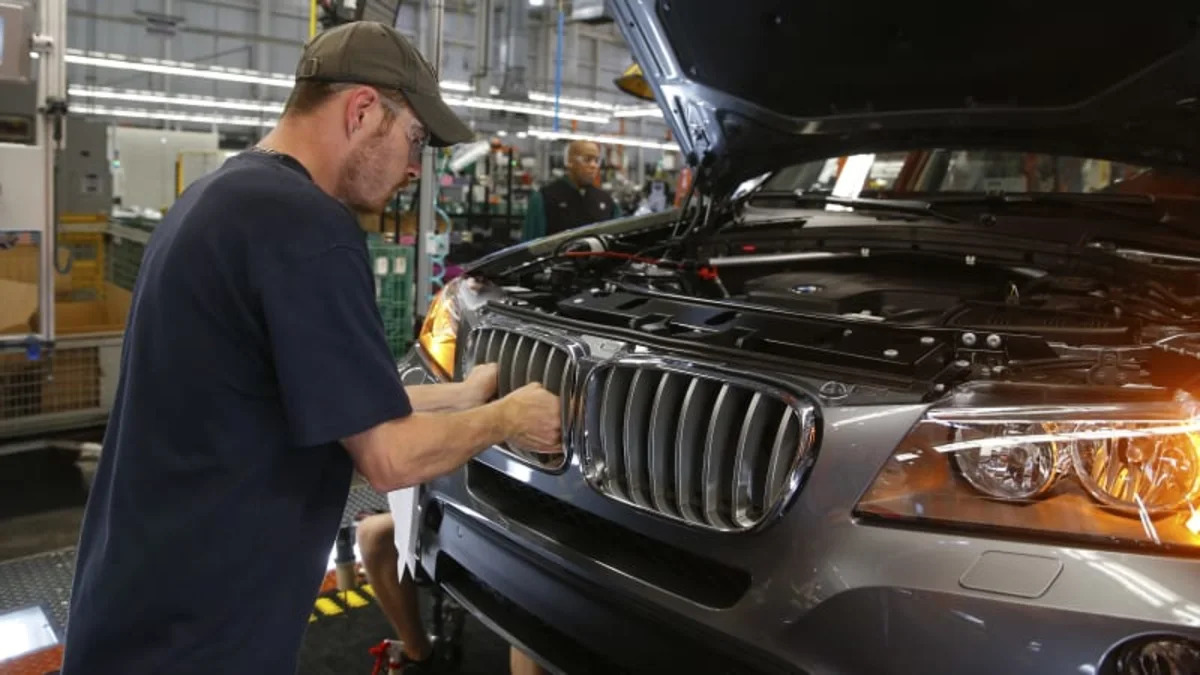While BMW is clearly a German company, the crossovers that are exceedingly important to it are actually made in Spartanburg, South Carolina. And more than that, the Spartanburg plant (physically located in the town of Greer) is where the corporate know-how and capability for those vehicles is concentrated. These are the vehicles – specifically, the BMW X3, X4, X5, X6, X7 – that drove record growth for the company in 2018, according to BMW.
But what’s most notable about BMW Group Plant Spartanburg, given current events, is that according to the U.S. Department of Commerce it was the largest automotive exporter by value for the fifth year running in 2018.
That’s worth emphasizing: largest automotive exporter by value. Not GM. Not Ford. BMW. And where might one assume that more than a few of those X vehicles are shipped to?
Some 360 miles southwest of Spartanburg is Mercedes-Benz U.S. International, Inc., in in Tuscaloosa County, Alabama. It started building vehicles in 1997. Since then, Daimler AG has invested in excess of $5.5 billion in the facility. It manufactures the crossover now known as the GLE, formerly the ML-Class. It also makes the GLE coupe and GLS. Daimler describes the Tuscaloosa facility as “the traditional home of SUV production” for those vehicles. When it reported its global 2018 sales, Daimler noted that on a global basis SUVs account “for more than a third of all Mercedes-Benz sales.”
According to the Chinese finance ministry, on December 15th the Chinese government will impose a 25% tariff on automobiles (and a 5% tariff on auto parts) from the U.S. Certainly this is going to have a direct effect on the sales of vehicles that are manufactured in the U.S. and exported to China. BMW and Mercedes are going to take it on the chin for the vehicles that they make in plants that they invested in so heavily in the U.S. Which could potentially mean that people in places like Greer, South Carolina, and Vance, Alabama, are going to find themselves in the crosshairs of the combatants. Soo too could Lincoln, which produces vehicles in places like Louisville, Kentucky (Navigator), Chicago, Illinois (Aviator) and Flat Rock, Michigan (Continental).
Although the Tesla Gigafactory 3 is rapidly nearing completion in Shanghai, it is worth noting that vehicles built in Fremont, California, are being sold in China in numbers that don’t make Musk unhappy. When December rolls around and the tariffs are slapped on the vehicles from California, odds are there will be some unhappy campers in Fremont.
And there are consequences for companies like GM and Ford, as well. Both of those automakers have manufacturing partners in China, so the domestically built products wouldn’t be affected by the 25% tariffs. But in 2018 General Motors sold 2.95 million vehicles in the U.S. It sold 3.64 million in China. While the companies make more money in the U.S., big export volumes can have non-trivial benefits to the bottom line.
The trade dispute is also inspiring another troubling trend. In May, CNBC reported that “Huawei is winning over more and more Apple fans in China as the escalated trade tensions have stoked ‘nationalist sentiment.’” China is a major market for Apple, just as it is for brands like Cadillac.
What happens if the “nationalist sentiment” carries over to things like Jeeps and Mustangs? What if it carries over to Buick, which has boasted about its “long and distinguished history in China that dates back to the early days of General Motors itself,” a market that arguably keeps the brand alive?
Tariffs are paid by consumers. And in this war of import penalties that is growing between the U.S. and China, workers in Fremont, Tuscaloosa, and Spartanburg are likely to be paying a hefty penalty, as well.
And none of this takes into account the overall slowing that is occurring in the global automotive market. Those X models that aren’t selling in China aren’t necessarily going to be selling in the U.S. (or elsewhere) if the overall number of vehicles being sold in the U.S. declines.
If the tariffs are going to be something of a gut punch, the slowing sales is going to be a swift kick, to boot.


Sign in to post
Please sign in to leave a comment.
Continue